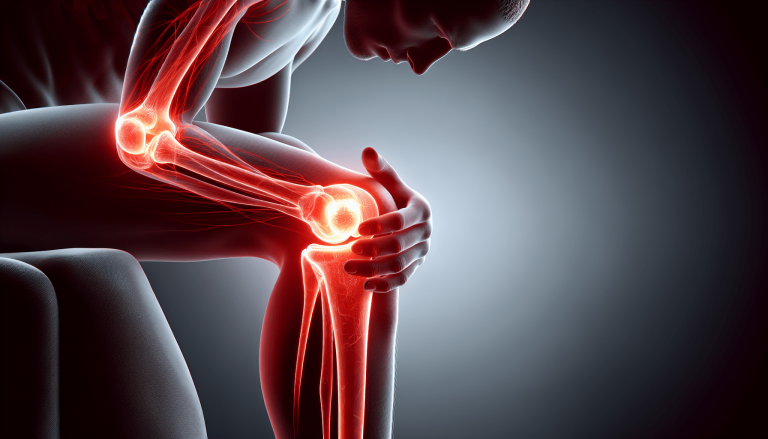Which Vitamin Is Best For Arthritis?
Managing arthritis can be challenging, but incorporating the right vitamins into your daily routine might make a big difference in alleviating your symptoms. In “Which Vitamin Is Best For Arthritis?” you’ll discover which specific vitamins have been shown to support joint health and reduce inflammation. Whether you’re grappling with osteoarthritis or rheumatoid arthritis, understanding the vital role of vitamins such as Vitamin D, Vitamin C, and B vitamins can empower you to take more control over your health and well-being. This guide will help you make informed decisions and find relief through targeted nutritional support.
Have you ever wondered which vitamin is best for arthritis? Living with arthritis can be challenging, and finding ways to ease the pain and support joint health is essential. One question that often arises is whether vitamins can play a significant role in managing arthritis symptoms. Join me as we explore the various vitamins that could make a difference in your journey with arthritis, and discover which one might be the best for you.
Understanding Arthritis
Before diving into vitamins, it’s important to understand what arthritis is and how it affects your body. Arthritis refers to inflammation of the joints, causing pain, stiffness, and swelling. There are over 100 different types of arthritis, but the most common forms are osteoarthritis (OA) and rheumatoid arthritis (RA).
Osteoarthritis (OA)
Osteoarthritis occurs when the protective cartilage that cushions your joints wears down over time. This can lead to joint pain and stiffness, usually in the hands, knees, hips, and spine.
Rheumatoid Arthritis (RA)
Rheumatoid arthritis is an autoimmune disease in which your immune system mistakenly attacks the lining of your joints. This leads to inflammation, pain, and eventually, joint damage.
The Role of Vitamins in Managing Arthritis
Vitamins play crucial roles in bodily functions, including immune support, bone health, and reducing inflammation. While they aren’t a cure for arthritis, certain vitamins can help manage symptoms and support overall joint health.
Vitamin D
Vitamin D is essential for maintaining strong bones and supporting the immune system. A deficiency in Vitamin D has been linked to an increased risk of developing arthritis and worsening of existing conditions.
Benefits of Vitamin D for Arthritis
- Bone Health: Vitamin D helps your body absorb calcium, a necessary mineral for bone strength. Adequate calcium levels can help protect your joints from damage.
- Immune Support: It plays a role in regulating the immune system, which can be particularly beneficial for those with RA.
- Pain Reduction: Some studies suggest that adequate Vitamin D levels may reduce joint pain.
Vitamin C
Vitamin C is a powerful antioxidant that helps the body repair tissues and reduce inflammation. It’s especially important for collagen formation, which is vital for maintaining the integrity of your cartilage.
Benefits of Vitamin C for Arthritis
- Antioxidant Properties: Helps fight free radicals that can damage joints.
- Collagen Production: Essential for cartilage maintenance and repair.
- Immune Boost: Strengthens the immune system, which can be beneficial for managing autoimmune types of arthritis.
Vitamin E
Vitamin E is another antioxidant that protects cells from the damage caused by free radicals. Its anti-inflammatory properties can help reduce pain and swelling in joints.
Benefits of Vitamin E for Arthritis
- Anti-inflammatory: Helps reduce inflammation and pain in the joints.
- Antioxidant: Protects cartilage from oxidative stress.
Vitamin B6
Vitamin B6 is vital for protein metabolism and cognitive development. It also plays a role in reducing inflammation.
Benefits of Vitamin B6 for Arthritis
- Reducing Inflammation: Helps decrease inflammation markers.
- Nerve Function Support: May help in reducing nerve-related discomfort.
Vitamin K
Vitamin K is crucial for bone health and clotting functions. It supports bone strength and helps in the repair of cartilage.
Benefits of Vitamin K for Arthritis
- Bone Health: Supports the maintenance of strong bones.
- Cartilage Repair: Aids in the repair and maintenance of joint cartilage.
Omega-3 Fatty Acids
While not a vitamin per se, omega-3 fatty acids, found in fish oil, have significant anti-inflammatory properties and are often discussed in the context of arthritis management.
Benefits of Omega-3 for Arthritis
- Anti-inflammatory: Reduces inflammation and pain.
- Joint Lubrication: Supports joint function and flexibility.

Comparing the Benefits of Different Vitamins
To help you understand which vitamin might be best for your arthritis, let’s compare their benefits in a more visual format:
| Vitamin | Key Benefits | Suitable For |
|---|---|---|
| Vitamin D | Bone health, immune support, pain reduction | Osteoarthritis, RA |
| Vitamin C | Antioxidant, collagen production, immune boost | All types of arthritis |
| Vitamin E | Anti-inflammatory, antioxidant | Osteoarthritis, RA |
| Vitamin B6 | Reduces inflammation, supports nerve function | RA |
| Vitamin K | Bone health, cartilage repair | Osteoarthritis, RA |
| Omega-3 Fatty Acids | Anti-inflammatory, joint lubrication | Osteoarthritis, RA |
Holistic Approach to Managing Arthritis
While vitamins can provide essential support in managing arthritis symptoms, they should be part of a holistic approach that includes a healthy diet, regular exercise, and appropriate medical treatments.
Balanced Diet
Consuming a diet rich in fruits, vegetables, lean proteins, and healthy fats ensures you get a broad spectrum of essential nutrients. Foods like fatty fish, nuts, seeds, and leafy greens are excellent sources of vitamins and minerals beneficial for arthritis.
Regular Exercise
Physical activity helps maintain joint function and reduce stiffness. Low-impact exercises such as swimming, walking, and yoga can be particularly beneficial for those with arthritis. Remember to consult with your doctor to create a safe and effective exercise plan that works for you.
Medical Treatments
Do not overlook traditional medical treatments. These can include medications like nonsteroidal anti-inflammatory drugs (NSAIDs), corticosteroids, and disease-modifying antirheumatic drugs (DMARDs) for RA. Always consult your healthcare provider for personalized medical advice.
Stress Management
Managing stress is crucial, as it can exacerbate arthritis symptoms. Techniques like meditation, deep breathing exercises, and mindfulness can help you stay relaxed and improve your emotional well-being.

Consult With Your Healthcare Provider
It’s essential to consult with your healthcare provider before adding any new supplements to your routine, especially if you have existing medical conditions or are taking other medications. They can provide personalized advice and ensure that you’re not exceeding safe intake levels for any vitamin.
Conclusion: Which Vitamin Is Best For Arthritis?
So, which vitamin is best for arthritis? The answer isn’t straightforward because it depends on individual needs and the type of arthritis you have. However, Vitamin D, Vitamin C, and Omega-3 fatty acids consistently stand out due to their comprehensive benefits for bone, cartilage health, and inflammation reduction. Remember to approach arthritis management holistically, combining the right vitamins with a balanced diet, regular exercise, and appropriate medical treatments for the best results. Taking proactive steps towards managing your arthritis can help improve your quality of life and keep you moving with greater comfort.
Additional Resources

The researchers found it…. The real core cause of joint pain, chronic arthritis, stiffness and bone problems… but it’s not looking pretty. So if you suffer from any of the above, read below as it’s crucial for your health and future…
The real reason why your joints hurt like hell is deep hidden inside a core area of your body, but it’s not your arms or legs….
As these private doctors found the reason, they showed how easy joint pain actually is to be fixed. All this pain, all these years… fixable with some daily habit they developed… takes less than 40 seconds in the afternoon.
This is helping 3,419 men and women every day stop their pain. So do you want to be amongst them? Don’t waste another second and check these findings…






